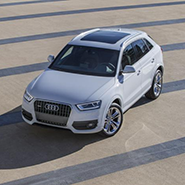- About
- Subscribe Now
- New York,
September 22, 2014

A "Great Brand Migration" is sending car owners in China searching for new brands to meet their escalating expectations, according to a new report by Boston Consulting Group.
The fluidity of the market presents both a great opportunity and a cause for alarm for auto brands, and this vacuum of loyalty cuts across most product categories. Now that most brands have established a presence in the country, the next major struggle will be to secure loyalty.
"In general, the China customer is less loyal," said Xavier Mosquet, BCG senior partner and automotive expert, Detroit. "The future generation wants to experiment and wants to try a number of things, so right now they have less attachment to the brand that they are using, and we’re seeing that across categories, that willingness to try new things.
"They have very high expectations and it's hard to meet them," he said. "It’s a general, generational behavior.
"Also, we see a very high need to upgrade. The next purchase is likely to be in a higher price bracket, and a brand with more prestige. They’re looking at a jump for their second or third car purchase, and they feel that they can aspire to better, so there’s a lot of trading up happening in that market.
"The ability to disrupt the market is very significant."
BCG interviewed 2,400 Chinese car owners for its "The Battle for Automotive Brand Loyalty in China" report.
No strings attached
The auto market in China remains extremely attractive. To put the potential in perspective, the United States currently has around 800 light vehicles per 1,000 people, whereas China has a ratio of 100 to 1,000, and the market is expected to grow six to nine percent each of the next four years.
However, the climate is becoming far more competitive.
According to BCG, there are now about 500 lightweight models on the market today, compared to 80 in 2000.
BMW is identified as a brand in a good position
BCG stresses that consumer motivations must be understood if brands are to capitalize on the "Great Brand Migration."
Broadly speaking, consumers fall into two categories: "brand shifters" and "upgraders." Brand shifters are either dissatisfied with their car's quality or feel no binding loyalty, whereas upgraders want their next purchase to reflect their elevated status.
Domestic volume brands fared the worst in the report, with only 17 percent of consumers with a car from a Chinese company intending to stick with that brand. Twenty-five percent of these consumers said they are going with another Chinese company, and 58 percent said they are trading up.
BCG noted that this overwhelming lack of loyalty stems from dissatisfaction with car quality and performance and services provided, suggesting that Chinese companies are failing to meet basic driver needs.
Also, an attractive brand image is still largely lacking among Chinese companies, which is a flaw for upgraders.
While foreign brands tend to meet driver needs more consistently, consumer expectations have moved beyond the rudimentary to the discerning.
Audi also has strong potential
That being said, foreign volume brands can expect to lose 70 percent of their customers, according to BCG. The research firm points out that auto brand loyalty in the U.S. is generally between 51 and 63 percent.
The motivation for owners of vehicles from foreign brands hinges mostly on reputation and inadequate service. Also, these brands are deemed insufficiently safe and reliable.
Oftentimes, consumers upgrading to a premium brand will select a car at the low-end of a portfolio, which then leads to frustrated expectations.
Premium foreign brands fare better than the lower players in the market. Forty-three percent of relevant respondents said they plan to stick with their premium brand when making a new purchase, 37 percent plan to switch and 16 percent intend to upgrade to a more premium vehicle.
Respondents cited poor service as a major reason for lack of loyalty.
Mr. Mosquet said that brands such as Audi, BMW and Mercedes-Benz have an advantage due to their established roots. These brands have already evolved beyond meeting rudimentary expectations, putting them in a good position to capitalize on the many consumers searching for a brand to commit to.
The report delves into the following topics: "China's Evolving Competitive Landscape," "Why Chinese Car Owners are Looking to Switch," "The Implications for Car Companies" and "Winning the Battle for Consumer Loyalty."
All across
Mr. Mosquet noted that the absence of reliable loyalty pervades most product categories in China, since consumers are still in the phase of solidifying their preferences.
Another report by BCG explores the online shopping tendencies of Chinese consumers such as a widely-held penchant for researching products at length.
“The Chinese Digital Consumer in a Multichannel World” report explains that the number of Chinese online shoppers is expected to reach 380 million by 2016, which presents brands with huge swaths of potential customers. Any giddiness marketers feel at such a prospect should be tempered by the fact that only .5 percent of online activity is conducted on brand or company Web sites (see story).
In the auto space, a reputation for reliable service will help brands attract migrating consumers.
"We’ve seen a lot of frustrations from the customers who feel they are not well treated during the ownership period," Mr. Mosquet said. "In the future we’ll see a lot of investment and focus on this customer service.
"That’s what's needed to lock in customers," he said.
Final Take
Joe McCarthy, staff writer on Luxury Daily, New York
Share your thoughts. Click here